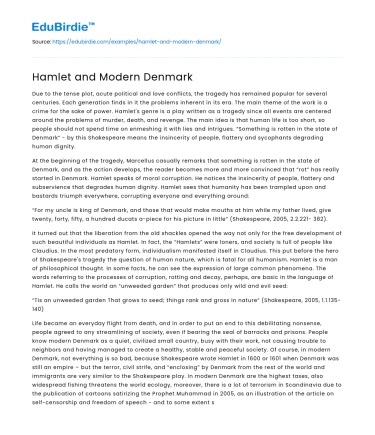Due to the tense plot, acute political and love conflicts, the tragedy has remained popular for several centuries. Each generation finds in it the problems inherent in its era. The main theme of the work is a crime for the sake of power. Hamlet's genre is a play written as a tragedy since all events are centered around the problems of murder, death, and revenge. The main idea is that human life is too short, so people should not spend time on enmeshing it with lies and intrigues. “Something is rotten in the state of Denmark” - by this Shakespeare means the insincerity of people, flattery and sycophants degrading human dignity.
At the beginning of the tragedy, Marcellus casually remarks that something is rotten in the state of Denmark, and as the action develops, the reader becomes more and more convinced that “rot” has really started in Denmark. Hamlet speaks of moral corruption. He notices the insincerity of people, flattery and subservience that degrades human dignity. Hamlet sees that humanity has been trampled upon and bastards triumph everywhere, corrupting everyone and everything around:
Save your time!
We can take care of your essay
- Proper editing and formatting
- Free revision, title page, and bibliography
- Flexible prices and money-back guarantee
“For my uncle is king of Denmark, and those that would make mouths at him while my father lived, give twenty, forty, fifty, a hundred ducats a-piece for his picture in little” (Shakespeare, 2005, 2.2.221- 382).
It turned out that the liberation from the old shackles opened the way not only for the free development of such beautiful individuals as Hamlet. In fact, the “Hamlets” were loners, and society is full of people like Claudius. In the most predatory form, individualism manifested itself in Claudius. This put before the hero of Shakespeare's tragedy the question of human nature, which is fatal for all humanism. Hamlet is a man of philosophical thought. In some facts, he can see the expression of large common phenomena. The words referring to the processes of corruption, rotting and decay, perhaps, are basic in the language of Hamlet. He calls the world an “unweeded garden” that produces only wild and evil seed:
“Tis an unweeded garden That grows to seed; things rank and gross in nature” (Shakespeare, 2005, 1.1.135-140)
Life became an everyday flight from death, and in order to put an end to this debilitating nonsense, people agreed to any streamlining of society, even if bearing the seal of barracks and prisons. People know modern Denmark as a quiet, civilized small country, busy with their work, not causing trouble to neighbors and having managed to create a healthy, stable and peaceful society. Of course, in modern Denmark, not everything is so bad, because Shakespeare wrote Hamlet in 1600 or 1601 when Denmark was still an empire – but the terror, civil strife, and “enclosing” by Denmark from the rest of the world and immigrants are very similar to the Shakespeare play. In modern Denmark are the highest taxes, also widespread fishing threatens the world ecology, moreover, there is a lot of terrorism in Scandinavia due to the publication of cartoons satirizing the Prophet Muhammad in 2005, as an illustration of the article on self-censorship and freedom of speech - and to some extent served as the impetus for the beginning of problems with Muslims in Europe (Simmons 2015).
If a person or even a nation does not like what is going on in the country, then this is the current task of society, which should already be solved by other means, but if a nation is happy with all the issues, it underlines the social problems that are expressed in the complete indifference of the person to the real world or in such conditions that leave the person no opportunity for action. It is not enough to admire the ability of Shakespeare to see some “eternal and universal” problems of mankind. In this admiration, that people should see that the problems that are relevant for the XVII-XVIII centuries still remain unresolved since we constantly return to this English playwright with questions.






 Stuck on your essay?
Stuck on your essay?

